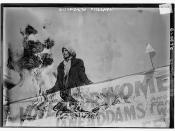Ten Thousand Sorrows
As a little girl walking with her mother, Elizabeth Kim hears herself called a "honhyol," "a despicable name that meant nonperson, mixed race, animal." Shortly after the end of the Korean War, the mother had returned from Seoul to her native village in shame, pregnant with a GI's child. Mother and daughter live as outcasts in a hut at the edge of town, and from the moment she can walk, the child works alongside her "Omma" in the rice fields.
When the girl is about 4, her grandfather and her uncle demand she be sold as a servant. When her mother refuses, the men string the woman up in her own house. Kim, a witness to this "honor killing," still sees "those milk-white feet" twitch, as if in a dance, then grow still.
As a "honhyol, female, nameless, without a birth date," she is a fourfold embodiment of shame.
Dumped at an orphanage run by Christian missionaries, she joins the other forgotten children, "the product of brief liaisons between soldiers on their way through and women on their way to hell." The kids are locked for hours at a time into cribs that look more like animal shelters. Occasionally, prospective parents peer into various cribs, looking for a cute specimen to adopt.
After hopeless months in her cage, Kim is finally adopted, sight unseen, by a missionary couple in central California. "Mom" and "Dad" are rigid fundamentalist Christians, and the girl they name Elizabeth begins a long sojourn in her own hell.
Although she learns English quickly and is bright and docile, a model child, she earns only scorn and an almost unbelievable cruelty. Treated more like a servant than like a daughter, she is punished for having nightmares, for being ill, for not smiling enough.


